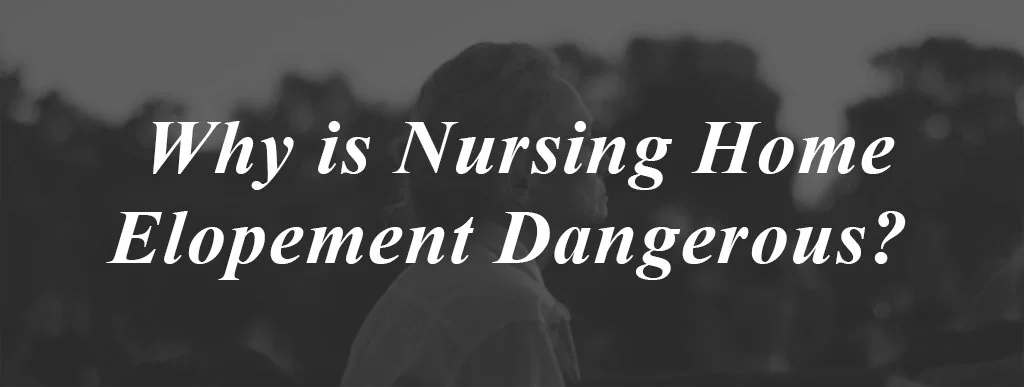
When you place your elderly or disabled loved one in the care of a nursing home, you expect them to take every measure to honor, respect, and protect them.
Unfortunately, many nursing homes are lacking quality care due to understaffing and overworked nurses and caregivers.
When nursing home staff fails to provide adequate supervision and security, it puts residents at risk.
Elopement is just one example of what can happen when a nursing home lacks the proper protocols and sufficient staff to care for all the residents.
Elopement or wandering residents is the result of neglect and the outcome can be devastating for family and friends of the victim.
To get in touch with our Georgia nursing home abuse lawyers, please don’t hesitate to call (706) 354-4000 or send an online message today.
What is Nursing Home Elopement?
In nursing homes and other long-term care facilities, an elopement is a form of unsupervised wandering that leads to the resident leaving the facility.
Elopement risk refers to the potential danger when a patient, often deemed too ill or impaired to make sound decisions, leaves a healthcare facility unauthorized, posing immediate threats to their health or safety.
This endangers the resident immediately and can result in serious injury, or even death, depending on circumstances such as the location of the facility, the time of year, how long it takes staff to recognize the resident is missing, and how long it takes to find the resident.
What’s the Difference Between Wandering and Elopement?
While elopement results in a patient leaving the facility altogether, wandering is when a resident leaves a safe area within the nursing home or long-term care facility.
This could mean they walk excessively or wander away from their room or a specific floor. If unsupervised, wandering can lead to elopement. Unsupervised or excessive wandering and elopement should be managed. If it’s not managed by staff properly, it is nursing home neglect.
Why do Nursing Home Residents Wander?
Nursing home residents may wander for a variety of reasons. For some, it may be out of boredom, for others it could be a mental impairment or confusion. Still, others may hear something that spikes their curiosity, or they may be hungry or thirsty.
Below is a list of potential reasons a long-term care facility patient might wander around:
- Unfamiliar environment
- Changes in medication
- Being overly medicated
- Unmet physical needs
- Unmet emotional or psychological needs
- Confusion
- Dementia
- Alzheimer’s Disease
- Sickness
- An attempt to go home or visit a loved one
- Sleep disorders
Some types of wandering include:
- Aimless wandering is when there’s no purpose behind it. This could be due to boredom, stress, being uncomfortable, or confusion
- Purposeful wandering has intent behind it. This is when a resident is intentionally trying to accomplish something, such as finding a nurse or returning home
- Reminiscent wandering is when a resident is unaware of their surroundings or confused. This is typical behavior for someone with dementia or Alzheimer’s Disease
The motivation behind the resident’s wandering helps nursing home staff to categorize the behavior, which in turn aides in creating the best plan of care to protect the resident. The nursing home is responsible for providing each resident with an appropriate plan of care to prevent or at the least, curb wandering. When elopement occurs, it is highly likely the resident has suffered from nursing home neglect.

Know the Dangers of Nursing Home Elopement
Many nursing home residents who elope are intentionally leaving because they believe they have something important to do. This type of purposeful wandering can be confusing for the resident. They may be trying to return to a home that no longer exists, visits a relative who has already passed away, or feed a pet that has been dead for many years.
Once they leave the premises of the facility they risk:
- High traffic areas
- Extreme weather
- A lack of needed medication
- Dehydration
- Malnutrition
- Falling
- Broken Bones
- Drowning
- Injury
- Death
What should Nursing Homes Be Doing to Prevent Elopement?
Elopement is preventable with the proper policies and procedures in place. Nursing homes and other long-term care facilities are required by law to properly staff the facility, train employees about wandering and elopement, provide a plan of care for each resident, and create and maintain a safe environment.
The Nursing Home Reform Act requires nursing homes to “provide services and activities to attain or maintain the highest practicable physical, mental, and psychosocial well-being of each resident in accordance with a written plan of care.”
Other federal nursing home regulations require long-term care facilities to:
- Develop a comprehensive care plan for each resident. (42 CFR §483.20)
- Ensure that residents receive adequate supervision and assistive devices to prevent accidents. (42 CFR §483.25)
- Promote each resident’s quality of life. (42 CFR §483.15)
- Maintain dignity and respect of each resident. (42 CFR §483.15)
- Be administered in a manner that enables it [the nursing home] to use its resources effectively and efficiently. (42 CFR §483.75)
Do you have a nursing home abuse claim?
BBGA provides free consultations. Our attorneys are ready to assist you.
Creating a Safe Environment for Residents
Creating a safe environment for nursing home residents who may be prone to wandering or elopement can include:
- Using night lights,
- Having a circular floorplan,
- An active alarm system,
- Removing rugs, electrical cords, and other tripping hazards,
- ID bracelets or another form of identification for residents who tend to wander,
- Properly staffing the facility,
- Implementing video surveillance at doors/exits,
- Properly training staff,
- Maintaining strict records,
- Changing door codes regularly, and
- Conducting multiple checks each day.
Understaffing is a major contributing factor to elopement because when a facility is not properly staffed, residents go unattended for long amounts of time. Wandering and elopement occur when residents are left unsupervised. This can also lead to injuries, dehydration, malnutrition, and a host of other problems.
While elopement shouldn’t happen, it unfortunately does, and how the nursing home administration and staff handles the situation can drastically change the outcome. If staff fails to react quickly if an alarm goes off or fails to follow proper protocol when a resident is missing, this is also negligence.
When Should I Call a Georgia Nursing Home Elopement Lawyer?
If you or your loved one is a victim of neglect at the hands of a caregiver or other nursing home staff, contacting a lawyer is crucial to your case.
Allowing nursing homes and other long-term care facilities to continue negligent or abusive practices endangers residents and puts their lives at risk. If your loved one has eloped or been injured due to excessive wandering, contact us today for a free consultation at (706) 354-4000 or reach us online.
